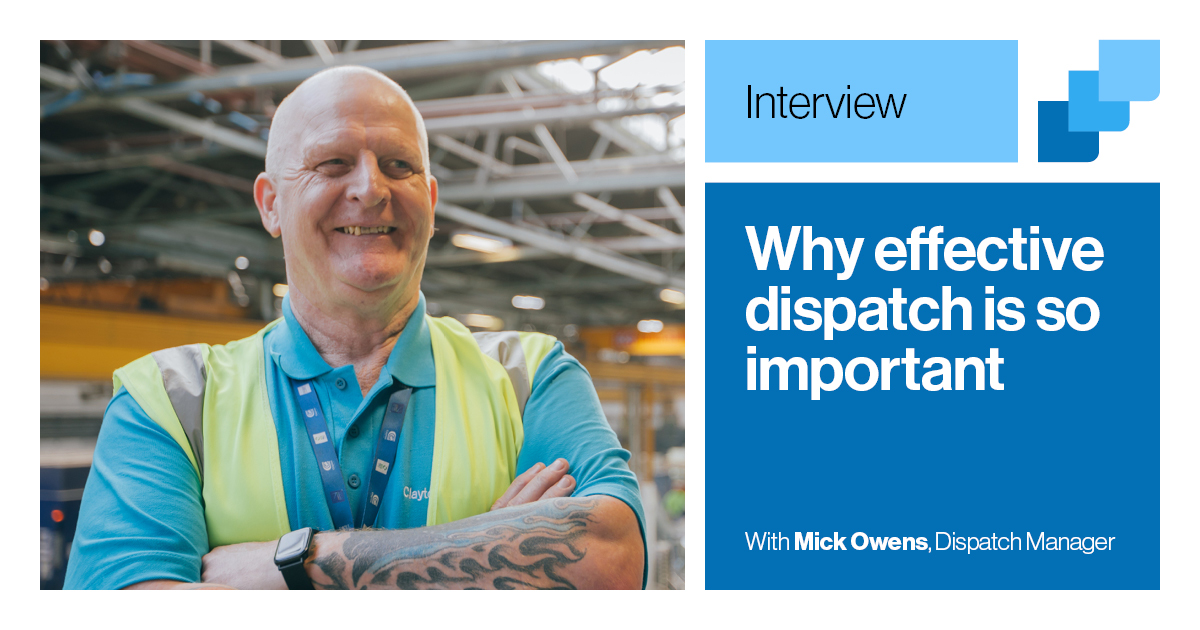We sat down with Clayton Glass’ no-nonsense Dispatch Manager, Mick Owens, to discuss the roles of dispatch, transport and delivery, and how important each of these areas are in producing measurable success for a company. Specifically, how a disciplined dispatch department contributes to a successful business. Here it is, on time, and in full.
Mick Owens is a family-oriented man, respected by all around him, and passionate about what he does. Mick has been Clayton Glass’ Dispatch Manager for the last 6 years. During his tenure, Clayton Glass have gone from a a mid-scale north-east-based glass supplier, to the largest glass manufacturing site in the UK. Success in this field requires a keen eye for detail. It also requires high-quality organisational skills, and communication and teamwork to match. Interestingly, measuring success in dispatch, transport and delivery is defined by one, single parameter – ‘On Time, In Full’ (OTIF).
ON TIME, IN FULL: THE BASIS OF HOW DISPATCH CONTRIBUTES TO SUCCESSFUL BUSINESS
OTIF is a percentage. It speaks to the proportion of your orders that make it to the correct location, at the correct hour, in the correct quantity. A business with a poor record in this department will earn a reputation for being unreliable in its deliveries. In this social media era, bad press can spread much more quickly among your specific industry. Subsequently, your business may start to unravel. It can therefore be seen that the role of the Dispatch Manager is a position that is crucial to a nationwide-delivering business. Accordingly, Mick Owens record at Clayton Glass is nothing short of impeccable.
Clayton Glass’ OTIF % across 2019 & 2020 is over 99.5%.
“The main role of the Dispatch Manager is getting everything right” says Mick. “That means everything has to be ready. Everything HAS to be on the correct stillages. So that everything can arrive at the doorstep of the correct customer”. Mick goes on to tell me that the first thing he does when he arrives at the Clayton Glass factory floor each morning is checking, checking and more checking. “I check if anything is missing. Check the units are on the correct stillage. I check the units are all clean and tidy. I’m really quite OCD about it!”
CHALLENGES IN DISPATCH: BUILDING THE PLATFORM FOR SUCCESSFUL BUSINESS
Turning attention to the more challenging aspects of his line of work, Mick tells me that he always strives for 100% when it comes to on time, in full. “I try my absolute best” says Mick, “at Clayton Glass, we’re dispatching over 5000 glass units a day. So that’s where the challenge lies.”. It is the sheer volume of products that Mick has to oversee that leads to challenges. Where one missing unit can be the difference between a satisfied customer and a very much unsatisfied one. So, the idea that a well-oiled, well-drilled dispatch department contributes to a successful business, is balanced by the fact that errors in dispatch can lead to the opposite.
If all of your customers are receiving their orders on time and in full, they will use you again in the future. In other words, you are trusted.
Mick Owens
The conversation naturally turns to the Clayton fleet. Something all of us at Clayton Glass are very proud of, including Mick. “When I started at Clayton, we did deliver to the whole UK, but the scale was much lower. Initially, we’d maybe deliver about 20 roof units a week to various places on our 9 vehicles. It’s all changed now. We now have 17 vehicles, including 2 articulated lorries and 5 18 tonne trucks. Where we used to deliver 20 roof units a week, we now do 80 a day”. Subsequently, Clayton Glass has been consistently growing for a long time. Examples of this growth include variables like annual turnover, to a larger number of website visitors, to an increased 37,000 square feet of manufacturing space. But, looking at the figures, arguably the largest growth has been in the Clayton Glass dispatch department.
HOW DOES DISPATCH CONTRIBUTE TO A SUCCESSFUL BUSINESS?
So, there is no doubt whatsoever that a company’s dispatch department is highly important in relation to the success of a business. Meaning, that Mick’s department needs to function as a well-oiled machine. “We are meticulous in keeping everything maintained.” Says Mick. “We keep our wagons in perfect working condition, and service them once every 6-8 weeks”. To put this in perspective, the average driver will have their car serviced once every 12 months. “You can’t control everything, but what we can control, we do control.” Says Mick. “For example, you cannot control whether a lorry will crash due to the fault of another driver. But you can control the person you put behind the wheel, and you can control the maintenance of the vehicle”. Mick states that he will do everything possible to ensure the safe arrival of a stillage to its destination.

With these protocols in place, Mick believes Clayton Glass has a solid platform from which to succeed in business. “If all of your customers are receiving their orders on time and in full, they will use you again in the future. In other words, you are trusted.” In Mick’s opinion the most important aspect of a company-client-relationship, is this trust that forms from a company delivering on its promises (pun intended). “each time you achieve a delivery on time and in full, this trust grows. Each time this trust grows you become that bit more likely to be recommended to someone else, that’s how it works.” adds Mick. It is in this way that Mick believes dispatch can contribute a to successful business.
MICK OWENS ON ‘THE CLAYTON DIFFERENCE’
I then ask Mick for his thoughts on ‘The Clayton Difference’ – the mantra that Clayton Glass lives by. To Expand, The Clayton Difference is what separates Clayton Glass from its competitors in the glass industry. Primarily, It is a set of values, and people-focused implementations that combine to create a large-scale corporation, but with the personal touch you’d expect from a family-run business. “Firstly, for me it’s all about commitment to the cause of getting everything on time, in full.” says Mick.
The main role of the Dispatch Manager is getting everything right. That means everything has to be ready, everything HAS to be on the correct stillages, so that everything can arrive at the doorstep of the correct customer.
Mick Owens
“One aspect that sums up The Clayton Difference for me, is the relationship our customers have formed with our drivers.” says Mick. “I try to keep the same drivers running the same routes so that they get to know the customers and a relationship is formed there. I think it gives the whole service more of a personal touch, something you wouldn’t necessarily expect from a large-scale company.” Mick continues, talking about how the customers tend to ring the drivers, if they have any problems or queries, instead of Mick himself, something that brings a grin to his face. “The drivers are fantastic, you’ve got to give it to them, they do their jobs really well!” Mick says with a smile.
CONCLUSION: HOW DISPATCH CONTRIBUTES TO SUCCESSFUL BUSINESS
In conclusion, it can be seen that Mick’s role as Dispatch Manager is one of great importance to the success of Clayton Glass as a company. Whether it be the constant checking of units and stillages, an almost obsessive servicing of vehicles, or our sturdy 17-strong fleet, we believe our dispatch department is one of our greatest assets, and sets us up to succeed, well into the future. Thanks for reading about how dispatch contributes to successful business.






